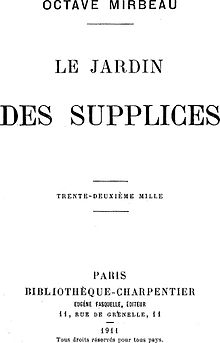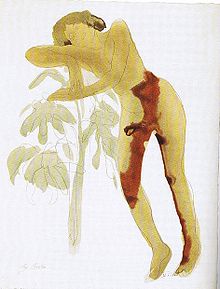
Octave Henri Marie Mirbeau was a French novelist, art critic, travel writer, pamphleteer, journalist and playwright, who achieved celebrity in Europe and great success among the public, whilst still appealing to the literary and artistic avant-garde with highly transgressive novels that explored violence, abuse and psychological detachment. His work has been translated into 30 languages.
Scaphism, also known as the boats, is reported by Plutarch in his Life of Artaxerxes as an ancient Persian method of execution. He describes the victim being trapped between two small boats, one inverted on top of the other, with limbs and head sticking out, feeding them and smearing them with milk and honey, and allowing them to fester and be devoured by insects and other vermin over time. Plutarch's report originates from a source considered dubious.
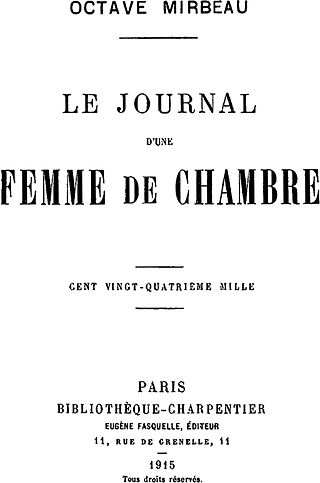
The Diary of a Chambermaid is a 1900 decadent novel by Octave Mirbeau, published during the Dreyfus Affair. First published in serialized form in L’Écho de Paris from 1891 to 1892, Mirbeau’s novel was reworked and polished before appearing in the Dreyfusard journal La Revue Blanche in 1900.
Rat torture is the use of rats to torture a victim by encouraging them to attack and eat the victim alive.
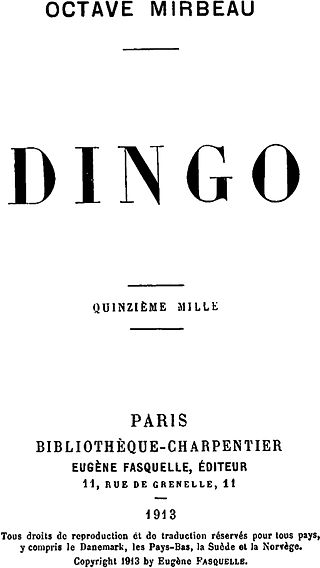
Dingo is a 1913 novel by the French novelist and playwright Octave Mirbeau.

Torture Garden is an album by John Zorn's Naked City with vocalist Yamatsuka Eye on vocals. The album collects the 42 "hardcore miniatures" recorded by the band. Nine of these short intense improvisations were spread across Naked City and the other 33 would feature on the next album, Grand Guignol. As Zorn explained in 1990:
Basically, this Naked City record came out, right. In the middle of it are about ten songs that are really short and hard. I said I wanted to do a record of 40 of those pieces, cause I was really interested in the compression and compactness of form that that music gets to. The guys at Nonesuch were not interested. If I wanted to do that, I better take it somewhere else. So what I managed to do was get them to bankroll the whole thing, and then I licensed it to Earache and Shimmy for basically no money and no royalties. So they are just putting this stuff out that Nonesuch bankrolled.

Dans le ciel is a novel written by the French journalist, novelist and playwright Octave Mirbeau. First published in serialized installments in L'Écho de Paris between September 1892 and May 1893, Dans le ciel, assembled and edited by Pierre Michel and Jean-François Nivet, first appeared its present form in 1989.

Là-Bas, translated as Down There or The Damned, is a novel by the French writer Joris-Karl Huysmans, first published in 1891. It is Huysmans's most famous work after À rebours. Là-Bas deals with the subject of Satanism in contemporary France, and the novel stirred a certain amount of controversy on its first appearance. It is the first of Huysmans's books to feature the character Durtal, a thinly disguised portrait of the author himself, who would go on to be the protagonist of all of Huysmans's subsequent novels: En route, La cathédrale and L'oblat.

Sébastien Roch is a novel written by the French journalist, novelist and playwright Octave Mirbeau, and published by Charpentier in 1890. Last French edition : L'Age d'Homme, 2011.
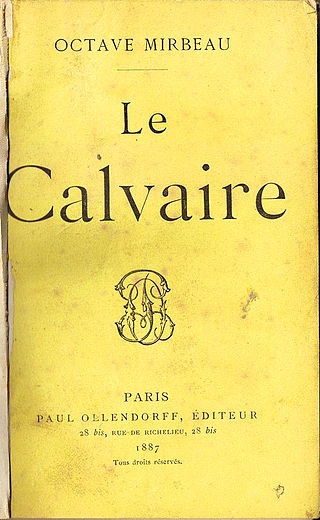
Le Calvaire (Calvary) is a novel written by the French journalist, novelist and playwright Octave Mirbeau, and published by Ollendorff in 1886.
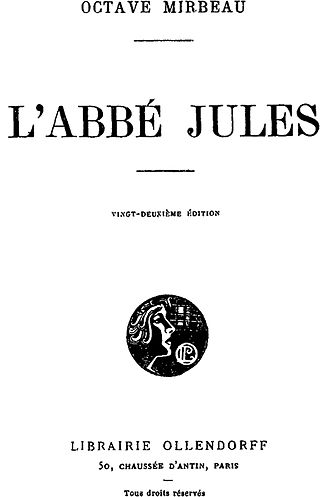
L'Abbé Jules is a novel written by the French journalist, novelist and playwright Octave Mirbeau, and published by Ollendorff in 1888.

Les Vingt et un Jours d'un neurasthénique is an expressionist novel by the French writer Octave Mirbeau, published by Charpentier-Fasquelle in August 1901.

Un gentilhomme is a novel by the French novelist and playwright Octave Mirbeau, published by Flammarion in 1920, after his death. Only three chapters were published.
Père Pamphile is a fictional character in the novel Abbé Jules, by the French writer Octave Mirbeau (1888). A marginal figure in Mirbeau's tale, Père Pamphile is nonetheless an extraordinary and striking character, whose history Mirbeau retraces in the course of a long flashback.

Lucien is one of the central fictional characters in the 1892-93 novel Dans le ciel, by French writer Octave Mirbeau.

Célestine is the main character and the narrator of the French novel by Octave Mirbeau, The Diary of a Chambermaid, 1900.
Clara is the main character in the French novel The Torture Garden (1899) by Octave Mirbeau.
A story by French writer Octave Mirbeau, Les Mémoires de mon ami was first published serially in Le Journal between November 27, 1898 and April 30, 1899, in the midst of the Dreyfus Affair. After the author’s death, it was collected in a volume published in 1919 Chez l'Illustre écrivain by Flammarion and then as a booklet in the collection "Une heure d’oubli", published also by Flammarion in 1920. The most recent edition, comprising 152 pages, appeared in 2007 in L'Arbre Vengeur (Talence).

Contes cruels is a two-volume set of about 150 tales and short stories by the 19th-century French writer Octave Mirbeau, collected and edited by Pierre Michel and Jean-François Nivet and published in two volumes in 1990 by Librairie Séguier. The title was taken from Auguste Villiers de l'Isle-Adam, of whom Mirbeau was a friend and admirer.

Louis de Robert was a French writer, winner of the prix Femina in 1911.
